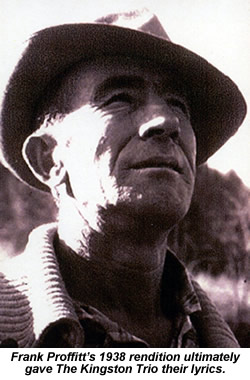 Proffitt grew up to become a farmer at the foot of North Carolina's Stone Mountain, supplementing his family's income by making and repairing traditional musical instruments. One day in 1937, a New York man called Frank Warner turned up with his own family, hoping to buy a dulcimer from Proffitt. Before they left, Warner asked Proffitt to sing him a few of the Appalachian folk ballads he knew, and Proffitt obliged, accompanying himself on an old banjo as he sang.
Proffitt grew up to become a farmer at the foot of North Carolina's Stone Mountain, supplementing his family's income by making and repairing traditional musical instruments. One day in 1937, a New York man called Frank Warner turned up with his own family, hoping to buy a dulcimer from Proffitt. Before they left, Warner asked Proffitt to sing him a few of the Appalachian folk ballads he knew, and Proffitt obliged, accompanying himself on an old banjo as he sang.
Warner returned to Proffitt's farm the following year, this time with an early battery-driven tape recorder, and asked for a repeat performance. "His eyes sparkled as I sang Tom Dula to him and told him of my grandma knowing Tom and Laura," Proffitt later recalled. "I walked on air for days after they left."
Assuming that the lyrics Proffitt sang that day were the same ones he uses on his 1962 album, the words Warner heard that day were:
"Hang your head Tom Dooley,
Hang your head and cry,
You killed lil' Laura Foster,
Poor boy you're bound to die.
"You met her on the mountain,
There you took her life,
Met her on the hillside,
Stabbed her with a knife.
"This time tomorrow,
Reckon where I'll be,
Down in yonder valley,
A-hanging on a white oak tree.
"This time tomorrow,
Reckon where I'll be,
Hadn't-a been for Grayson,
I'd-a been in Tennessee.
"You met her on the mountain,
It was there I suppose,
There you went and killed her,
And then you hid her clothes.
"I'll take down my banjo,
I'll pick it on my knee,
By this time tomorrow,
It'll be no use to me." (18)
We can forgive Proffitt his "banjo" reference - which I'm sure he knew was strictly incorrect - for its link to the instrument he himself was playing. Suddenly the banjo player in the song becomes the same man you're listening to right now, and even I'm not pedantic enough to deny Proffitt the little bonus that provides.
We should pause here for a second to get the chronology right. Warner taped Proffitt singing him something very like the above version of Tom Dooley in 1938, but Proffitt himself wouldn't put it to disc until 1962. Warner recorded his own version a full ten years before that - in 1952 - but first he passed the lyrics Proffitt had given him to the song collectors John and Alan Lomax. The chain this gives us so far is: Proffitt, Warner, Lomax.
When the Lomaxes published their 1947 collection Folk Song USA, they included words and music for Tom Dooley, crediting Warner as the man who'd given it to them. The lyrics appear in their book like this:
"Hang down your head Tom Dooley,
Hang down your head & cry,
Hang down your head Tom Dooley,
Poor boy you're bound to die.
"I met her on the mountain,
And there I took her life,
I met her on the mountain,
And stabbed her with my knife.
"This time tomorrow,
Reckon where I'll be,
If it hadn't-a been for Grayson,
I'd-a been in Tennessee.
"This time tomorrow,
Reckon where I'll be,
In some lonesome valley,
A-hanging from a white oak tree." (19)
Warner's amendments give the chorus an extra little sing-along element by repeating its opening line, and also drop a couple of inessential verses. Whether The Kingston Trio heard Warner singing the song, or simply picked it up in writing from the Lomax collection, these were the verses they used. In 1958, they added the song to their live set, recorded it as part of their debut album that same year and - as we've seen - made it a massive international hit. Now the chain ran: Proffitt, Warner, Lomax, Kingston Trio.
The first Proffitt knew of all this was when he happened to hear the band perform what was still pretty clearly his version of the song on TV. He was, to put it mildly, surprised.
In the early 1960s, Proffitt joined with Warner and the Lomaxes' publishers to sue The Kingston Trio over Tom Dooley's publishing rights and secure the past and future income those rights could now be expected to generate. The case was settled out of court, but only after an agreement ensuring that the Proffitt, Warner and Lomax families all receive a cut of Tom Dooley's royalties to this day. Despite the fact that it was Proffitt's 1938 rendition that started this whole chain, even his own album 24 years later credits the song as "trad./ arr. Lomax/Warner/Proffitt".